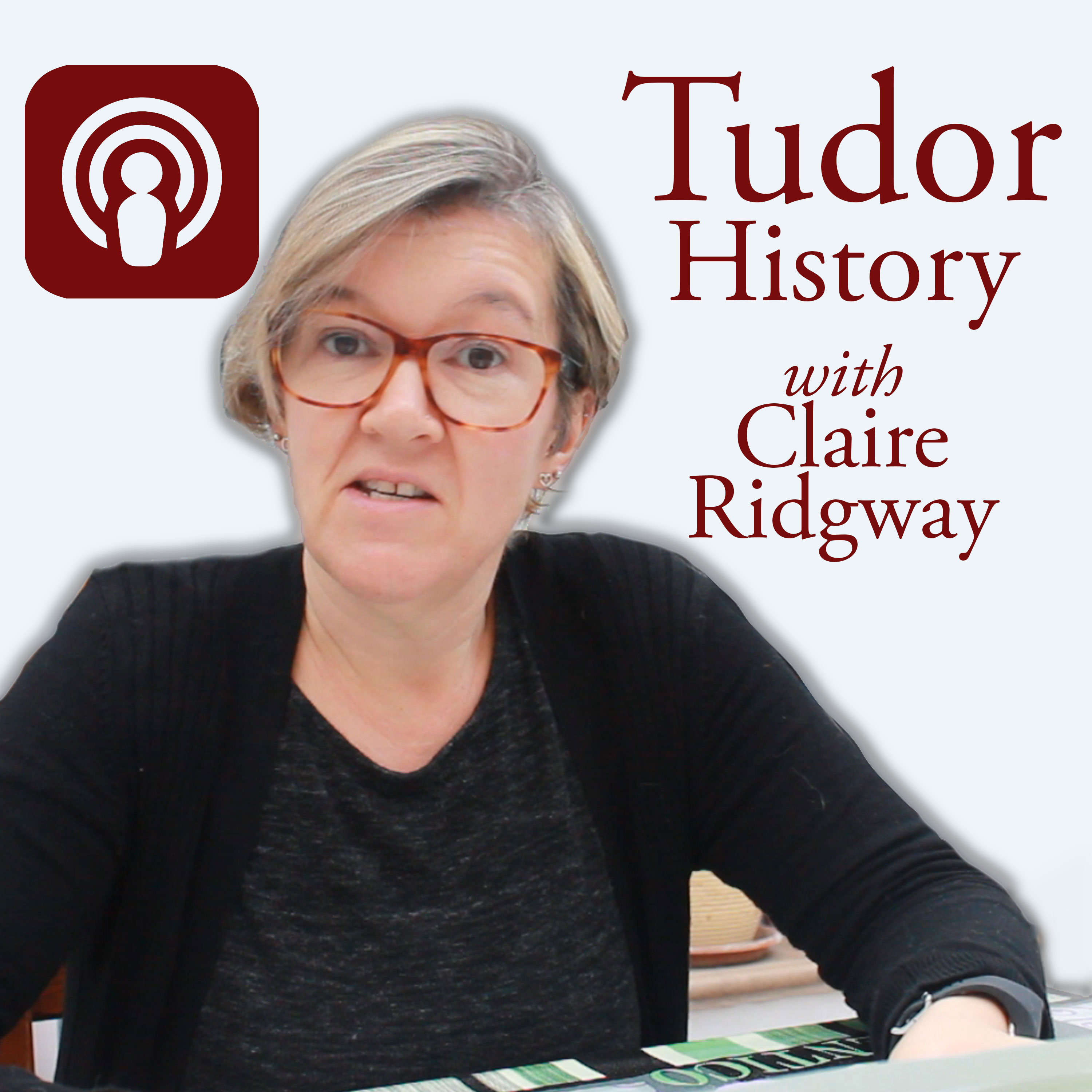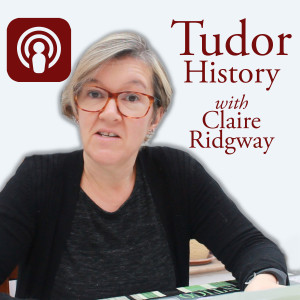Tudor History with Claire Ridgway

Step back into a world of intrigue, passion, and ruthless ambition — welcome to Tudor England. Join historian and bestselling author Claire Ridgway as she uncovers the riveting stories of the Tudor dynasty. From the scandalous love affairs of King Henry VIII to the tragic fall of Anne Boleyn, the fierce reign of Elizabeth I, and the lesser-known secrets of Tudor court life, this podcast brings history to life in vivid detail. Hear dramatic tales of betrayal, execution, forbidden love, and political manoeuvring that shaped England forever. Discover daily Tudor history with fascinating “On This Day” episodes — unique insights you won’t find in typical history books. Get behind-the-scenes stories from Claire’s own research trips to historic sites like the Tower of London, Hampton Court Palace, Hever Castle, and more. Enjoy interviews with top historians and experts in Tudor studies, plus lively Q&A sessions tackling listeners’ burning Tudor questions. 🖋 Who is Claire Ridgway? Claire is the author of the bestselling On This Day in Tudor History series and numerous other Tudor books loved by readers around the world. She founded The Tudor Society, connecting enthusiasts with experts through live online events, and runs the hugely popular history websites The Anne Boleyn Files and www.ClaireRidgway.com. Her mission: to uncover the human stories behind the crown — the hopes, fears, and triumphs of not only kings and queens but also the courtiers, rebels, and ordinary people who lived under the Tudor rose. What can you expect? - Gripping accounts of famous events like the Field of Cloth of Gold, the Dissolution of the Monasteries, or the Babington Plot. - Intimate portraits of Tudor figures: Anne Boleyn’s charm and downfall, Thomas Cromwell’s rise and brutal fall, Elizabeth I’s cunning survival. - Dark mysteries and unsolved deaths — who really killed Amy Robsart? Was Katherine Howard truly guilty? - Special episodes on Tudor fashion, food, medicine, and the day-to-day lives of Tudor men and women. Join thousands of Tudor fans worldwide Never miss an episode — subscribe now and become part of a global community that can’t get enough of Tudor drama. Explore more with Claire’s books, free resources, and live historical events at www.ClaireRidgway.com. Ready to travel back 500 years? Press play and let the adventure begin.
Step back into a world of intrigue, passion, and ruthless ambition — welcome to Tudor England. Join historian and bestselling author Claire Ridgway as she uncovers the riveting stories of the Tudor dynasty. From the scandalous love affairs of King Henry VIII to the tragic fall of Anne Boleyn, the fierce reign of Elizabeth I, and the lesser-known secrets of Tudor court life, this podcast brings history to life in vivid detail. Hear dramatic tales of betrayal, execution, forbidden love, and political manoeuvring that shaped England forever. Discover daily Tudor history with fascinating “On This Day” episodes — unique insights you won’t find in typical history books. Get behind-the-scenes stories from Claire’s own research trips to historic sites like the Tower of London, Hampton Court Palace, Hever Castle, and more. Enjoy interviews with top historians and experts in Tudor studies, plus lively Q&A sessions tackling listeners’ burning Tudor questions. 🖋 Who is Claire Ridgway? Claire is the author of the bestselling On This Day in Tudor History series and numerous other Tudor books loved by readers around the world. She founded The Tudor Society, connecting enthusiasts with experts through live online events, and runs the hugely popular history websites The Anne Boleyn Files and www.ClaireRidgway.com. Her mission: to uncover the human stories behind the crown — the hopes, fears, and triumphs of not only kings and queens but also the courtiers, rebels, and ordinary people who lived under the Tudor rose. What can you expect? - Gripping accounts of famous events like the Field of Cloth of Gold, the Dissolution of the Monasteries, or the Babington Plot. - Intimate portraits of Tudor figures: Anne Boleyn’s charm and downfall, Thomas Cromwell’s rise and brutal fall, Elizabeth I’s cunning survival. - Dark mysteries and unsolved deaths — who really killed Amy Robsart? Was Katherine Howard truly guilty? - Special episodes on Tudor fashion, food, medicine, and the day-to-day lives of Tudor men and women. Join thousands of Tudor fans worldwide Never miss an episode — subscribe now and become part of a global community that can’t get enough of Tudor drama. Explore more with Claire’s books, free resources, and live historical events at www.ClaireRidgway.com. Ready to travel back 500 years? Press play and let the adventure begin.
Episodes
Episodes



Monday May 01, 2023
James Beinham and his bed of roses - MondayMartyr
Monday May 01, 2023
Monday May 01, 2023
This week's Monday Martyr is reformer James Bainham, who was burnt at the stake at Smithfield on 30th April 1532, in the reign of King Henry VIII. #henryviii #toweroflondon #tudorhistory #reformation
You can find my books on Amazon at http://viewauthor.at/claireridgway



Monday Apr 24, 2023
Protestant William Flower - MondayMartyr
Monday Apr 24, 2023
Monday Apr 24, 2023
This week's #mondaymartyr is Protestant martyr William Flower (known also as Branch) who was burnt at the stake for heresy at St Margaret's Church in Westminster, London, on this day in Tudor history, 24th April 1555, in the reign of Queen Mary I.
He also had his hand cut off, the punishment for his attack on a Catholic minister.



Friday Mar 24, 2023
From Spare to Heir - How things changed for Henry VIII in 1502
Friday Mar 24, 2023
Friday Mar 24, 2023
This short video is based on the livestream I did called “The Making of a King: Henry VIII’s Education and Upbringing”, in which I mentioned how Henry’s education changed when he went from spare to heir in 1502 following the death of his older brother, Arthur.
You can watch my livestream at https://youtube.com/live/6DLi_FUwWV8?feature=share
#HenryVIII #TudorHistory #TheKingIsDead #LongLiveTheKing #EnglandMonarchy #RoyalSuccession #RenaissanceHistory #DivorcedBeheadedDied #TudorDynasty #CrownSuccession



Saturday Dec 24, 2022
The Tudors in their own words - Happy Christmas from Thomas Tusser
Saturday Dec 24, 2022
Saturday Dec 24, 2022
Merry Christmas! Today, historian Claire Ridgway shares some Christmassy words from 16th century poet and farmer Thomas Tusser.



Friday Dec 23, 2022
The Tudors in their own words - Lady Jane Grey
Friday Dec 23, 2022
Friday Dec 23, 2022
Lady Jane Grey, or Queen Jane, was a highly intelligent young woman and a staunch Protestant, and in today's "The Tudors in their own words", historian Claire Ridgway shares a couple of quotes from Jane regarding religion.



Thursday Dec 22, 2022
The Tudors in their own words - Elizabeth I about Mary, Queen of Scots
Thursday Dec 22, 2022
Thursday Dec 22, 2022
In today's "The Tudors in their own words", historian Claire Ridgway shares words from Queen Elizabeth I regarding a woman known as her nemesis, Mary, Queen of Scots.



Wednesday Dec 21, 2022
The Tudors in their own words - Queen Elizabeth I about Edward de Vere
Wednesday Dec 21, 2022
Wednesday Dec 21, 2022
In today's "The Tudors in their own words", historian Claire Ridgway shares a funny story and quote from Queen Elizabeth I regarding Edward de Vere, 17th Earl of Oxford.



Tuesday Dec 20, 2022
The Tudors in their own words - Sir Philip Sidney
Tuesday Dec 20, 2022
Tuesday Dec 20, 2022
In today's "The Tudors in their own words", historian Claire Ridgway shares poetry from the famous Elizabethan poet, Sir Philip Sidney.

I'm historian Claire Ridgway
I'm the best-selling author of 13 history books and the founder of the TheAnneBoleynFiles.com, Elizabethfiles.com and The Tudor Society.
I help Tudor history lovers worldwide to gain access to experts and resources to discover the real stories behind myths and fiction, so that they grow in knowledge while connecting with like-minded people and indulging their passion for history.
I am a Fellow of the Royal Historical Society. I was a contributor for the BBC docudrama The Boleyns: A Scandalous Family, and have been featured in BBC History Extra, USA Today, History of Royals Magazine, the Express, and Refinery 29, as well as on podcasts including Suzannah Lipscomb's Not Just the Tudors, Gareth Russell's Single Malt History, Natalie Grueninger's Talking Tudors, Hever Castle's Inside Hever, James Boulton's Queens of England, and many more.









